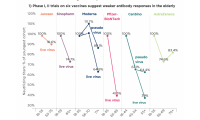-
GSK, Vir look beyond COVID-19 to develop new therapies for flu and other respiratory viruses
- Source: drugdu
- 330
- February 22, 2021
-
Roche’s faricimab hits primary endpoint in wet AMD studies
- Source: drugdu
- 279
- January 31, 2021
-
Ridgeback Biotherapeutics’ Ebola treatment scores FDA approval
- Source: drugdu
- 248
- December 24, 2020
-
Janssen eyes US approval for EGFR-targeting NSCLC therapy
- Source: drugdu
- 221
- December 11, 2020
-
Data Byte
- Source: drugdu
- 361
- November 27, 2020
-
China’s Sinovac reports mixed findings in early coronavirus vaccine trials
- Source: drugdu
- 145
- November 19, 2020
-
Discovery of novel hidden gene in SARS-CoV-2
- Source: drugdu
- 286
- November 14, 2020
-
Enhertu granted Priority Review in the US for the treatment of HER2-positive metastatic gastric cancer
- Source: drugdu
- 319
- November 4, 2020
-
Long non-coding RNA CASC9 promotes gefitinib resistance in NSCLC by epigenetic repression of DUSP1
- Source: drugdu
- 442
- November 3, 2020
-
Natural COVID-19 Infection Produces Robust T Cell Response and Memory to Fight Future Infections, Finds Study
- Source: https://www.hospimedica.com/covid-19/articles/294784403/natural-covid-19-infection-produces-robust-t-cell-response-and-memory-to-fight-future-infections-finds-study.html
- 243
- September 9, 2020
your submission has already been received.
OK
Subscribe
Please enter a valid Email address!
Submit
The most relevant industry news & insight will be sent to you every two weeks.













